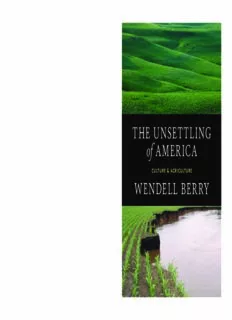
The Unsettling of America: Culture & Agriculture PDF
Preview The Unsettling of America: Culture & Agriculture
“ The Unsettling of America is one of the most cogent books of the decade T and in its claims for a healthy man-earth relationship, one of our most H revolutionary.” —Wallace Stegner E U “ This book is about culture in the deep, ripe sense: a nurturing habitat. With N unwavering focus, Wendell Berry shows what we lost of our real human S American potential when we lost our commitment to living well, in place, E on the land.” —gary Snyder T T Since its publication by Sierra Club Books in 1977, The Unsettling of America L has been recognized as a classic of American letters. In it, Wendell Berry argues I N that good farming is a work of culture and a work of faith and hope. Today’s G agribusiness, however, takes farming out of its cultural context and away from fami- o T H E U N S E T T L I NG lies. As a result, we as a nation are more estranged from the land than ever —from the f intimate knowledge, love, and care of it. A Sadly, his arguments and observations are more relevant than ever. We continue M of A M E R IC A to suffer loss of community, the devaluation of human work, and the destruction E R of nature under an economic system dedicated to the mechanistic pursuit of prod- I ucts and profits. Although “this book has not had the happy fate of being proved C cUltUre & agr IcUltUre A wrong,” Berry writes, there are good people working “to make something comely and enduring of our life on this earth.” Wendell Berry is one of those people, writing and W W E N DE L L BE R RY working, as ever, with passion, eloquence, and conviction. E N Wendell Berry is the author of more than fifty books D of poetry, fiction, and essays. He was recently awarded the E National Humanities Medal, the Cleanth Brooks Medal for L Lifetime Achievement by the Fellowship of Southern Writers, L and the Louis Bromfield Society Award. For more than forty B years he has lived and farmed with his wife, Tanya Berry, in E Kentucky. R R Y U.S. $16.95 SOcIal ScIence Jacket Design: Debbie Berne Art: © Andy Larson and Jim Richardson ISBN 978-1-61902-599-8 51695 www.counterpointpress.com 9 781619 025998 Distributed by Publishers Group West The Unsettling of America The Unsettling of America: Culture & Agriculture by Wendell Berry C O U N T E R P O I N T b e r k e l e y Copyright © 1977 Wendell Berry Afterword © 1996 All rights reserved under International and Pan-American Copyright Conventions. No part of this book may be used or reproduced in any manner whatsoever without written permission from the publisher, except in the case of brief quotations embodied in critical articles and reviews. First Counterpoint edition 2015 Library of Congress Cataloging-in-Publication Data Berry, Wendell 1934- The Unsettling of America. 1. Agriculture—Economic aspects—United States. 2. Agriculture—Social aspects—United States. I. Title hd1761.b47338.1'097377-3729 isbn 978-1-61902-599-8 Interior design by David Bullen Cover design by Debbie Berne Counterpoint Press 2560 Ninth Street, Suite 318 Berkeley, CA 94710 www.counterpointpress.com Printed in the United States of America Distributed by Publishers Group West 10 9 8 7 6 5 4 3 2 1 For Maurice Telleen Contents Preface ix Preface to the Second Edition xi Acknowledgments xiii chapter one The Unsettling of America 5 chapter two The Ecological Crisis as a Crisis of Character 19 chapter three The Ecological Crisis as a Crisis of Agriculture 31 chapter four The Agricultural Crisis as a Crisis of Culture 43 chapter five Living in the Future: The “Modern” Agricultural Ideal 55 chapter six The Use of Energy 85 chapter seven The Body and the Earth 101 chapter eight Jefferson, Morrill, and the Upper Crust 147 chapter nine Margins 175 Afterword to the Third Edition 229 Notes 235 Preface This book was meant to be a criticism of what I have called modern or ortho- dox agriculture. As I now realize, it is more a review than a criticism. Criticism requires a subject that is “finished.” When agriculture is “finished,” no would- be critic will be available. I am therefore constrained to accept my demotion as a privilege. Nevertheless, there is a difficulty in writing a book on so inherently topical a subject as agricultural policy, and this difficulty is time: events that were the immediate cause of the book may be “finished” before the writing is. No reader of this book can fail to observe that it deals at length with the assumptions and policies of former Secretary of Agriculture Earl L. Butz, though Mr. Butz and the administration he served are now out of office. I can only insist that my book is not for that reason out-of-date. Secretary Butz’s tenure in the Department of Agriculture, and even his influence, are matters far more transient than the power and the values of those whose inter- ests he represented. Moreover, the cultural issues that I attempt to deal with have been with us since our history began, and, barring miracle or catastrophe, they will be with us for a long time to come. As a matter of fact, this book’s origins go back farther than the secretaryship of Mr. Butz. The first notes I made for it were incited by a news story in the summer of 1967 on the report of President Johnson’s “special commission on federal food and fiber policies.” The commission said, according to an article in the Louisville Courier- Journal, that the country’s biggest farm problem was a surplus of farmers: “. . . the technological advances in agriculture have so greatly reduced the need for manpower that too many people are trying to live on a national farm · ix ·
Description: